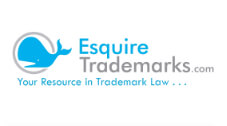About Podcast Names and Trademark Law
Trademark a Podcast Brand
This is a presentation provided to educate podcast producers about trademark law as it relates to the podcast industry. Trademark a Podcast Brand.
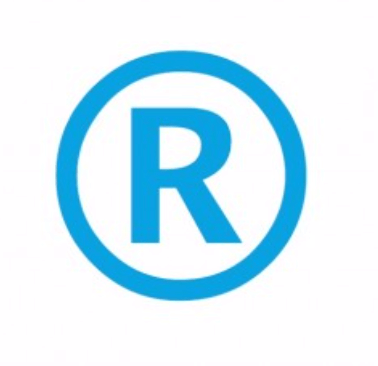
Facts: How Many Podcast Trademarks Are Registered in the United States?
At the time of writing this article, there are over 42,000 records at the US Trademark Office that list “podcast” in the identification. Almost 18,000 are registered trademarks listing podcasts. Over 15,000 are live podcast trademark registrations.
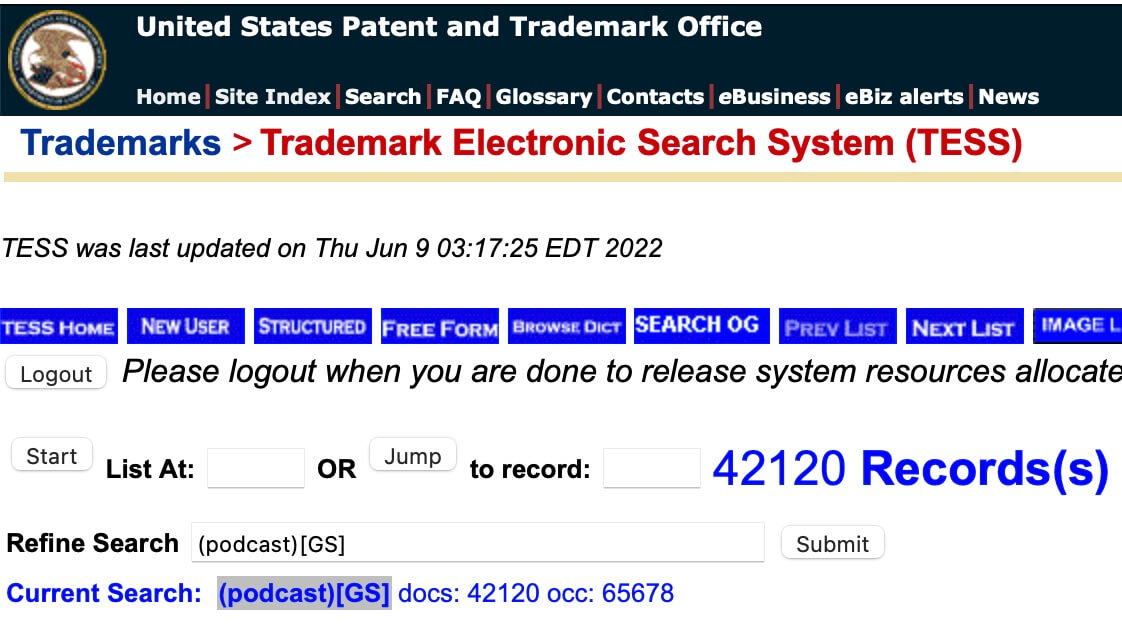
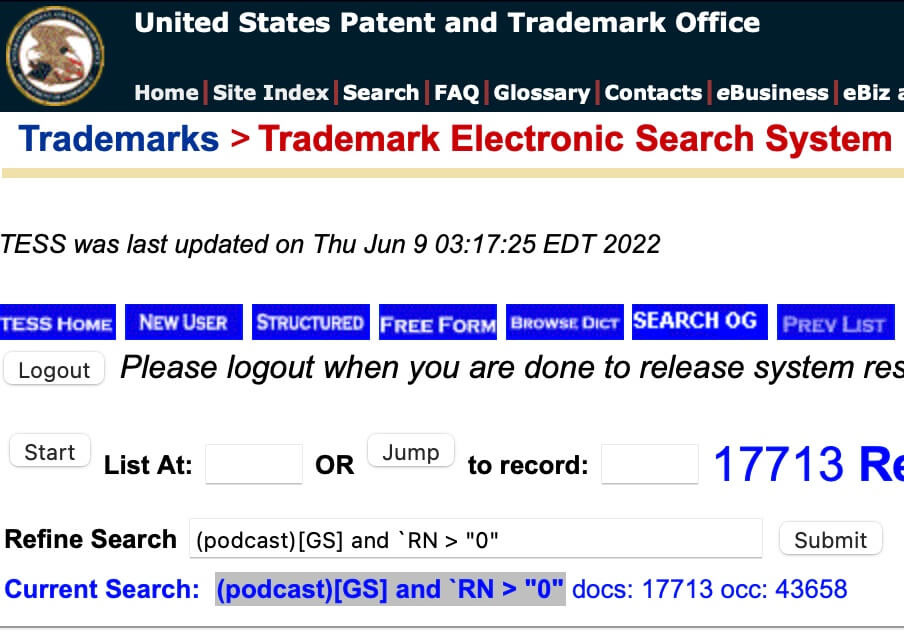
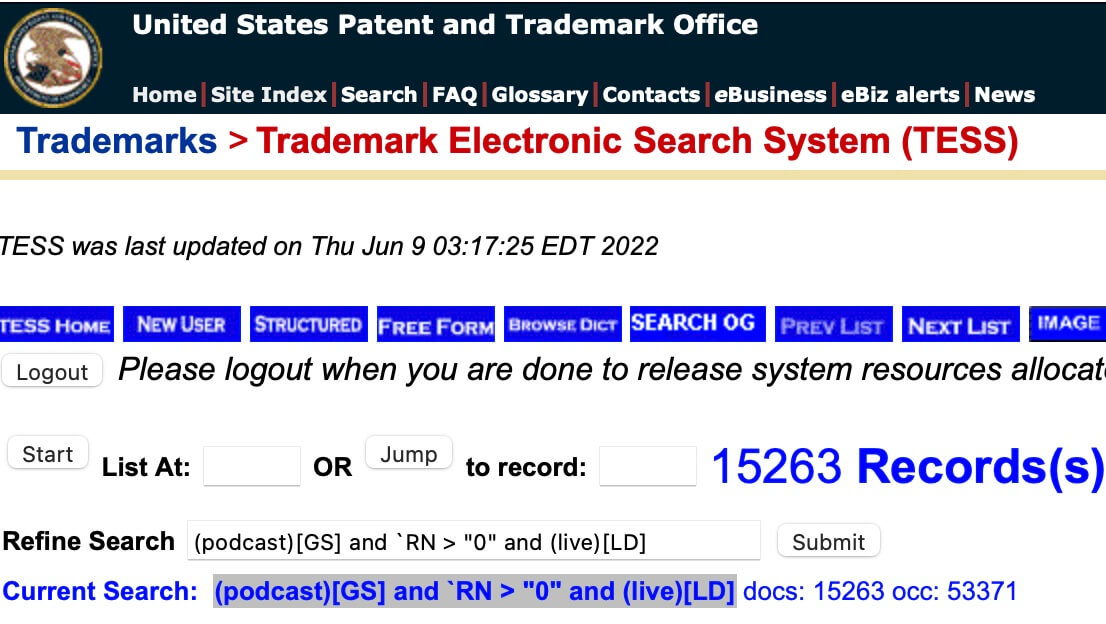
Basics: What is a Podcast Trademark?
A trademark is a source identifier. That is something … a word, name, phrase, symbol, even a sound … that functions to identify a particular source of goods or services.
A podcast trademark is a name, phrase, or logo that is use uniformly to identify your podcast, and you provide content to consumers using that name, phrase, or logo.
I use the terms “trademark” and “service mark” interchangeably. But there is a difference. Podcasting is education and entertainment – a service. (A Service Mark). The production and streaming of this content is considered a service, and the appropriate designation for these “services” is a Service Mark.
Trademark Class 041 Education and Entertainment
Trademark Class 038 Streaming of Audio/Video
Use of a name with the tangible goods – swag, apparel, t-shirts, wristbands, stickers and mugs – is technically a “Trademark” use.
Trademark Class 009: Downloadable Audio
Trademark Class 025: Apparel
Trademark Class 016: Stickers & Printed Materials
To legally qualify as a trademark, the designation (1) must be capable of identifying the provider/manufacturer, and (2) the mark must distinguish the source of goods from other manufacturers.
Consider the terms: PODCAST, RADIO, NETWORK, NEWS, DAILY. These are examples of terms that do not qualify for trademark protection because they are generic or descriptive. Under the law, anyone in the podcast field has a right to use these terms.
Visit this detailed article for a more detailed explanation of What is a Trademark.
How are Trademark Rights Acquired in Podcasts?
Common Law Use Can Create Trademark Rights in a Podcast Brand:
For podcasts, trademark rights come into existence when you use the name identifying your show, and the show is released to the listening public. Common law trademark rights are created by the act of rendering the service (providing the audio / video content) to listeners / viewers while branding the service.
- Create Common Law Trademark Rights By Releasing Branded Content
- Use the Mark Prominently – Loud and Proud – Should be the Podcast Name – Should be in the Title & Intro
- Use the Mark Uniformly – Randomly adding words / phrases randomly to you mark dilutes the brand
Acquire & Perfect Trademark Rights in a Podcast Brand With a Trademark Application / Registration
I’ve got a great name, but haven’t launched the podcast!
When you apply to register a trademark for a podcast, you can create a “constructive use” date to establish trademark rights. This is extremely helpful to reserve rights in a podcast brand before you actually launch. That is, the trademark application filing date serves as the first use, or priority date. Trademark Priority is important! When evaluating rights in a dispute priority – or who was first – matters.
You can apply to register a trademark for a podcast whether you are using the name or are not. If you are not, the application is classified as an intent-to-use trademark application, and more steps are required. More detail is discussed below.
What’s an Intent to Use Trademark Application & How Does it Work?
I’ve got the best name for my podcast!
The show won’t be launched for months!
Take advantage of the intent-to-use trademark application process to lock in trademark rights asap while you build out the show. You can use the intent to use trademark process to get as much as 4 years of reserve time. So, if you have a great name. LOCK IT IN with an Intent to Use Trademark Application.
- File the Intent to Use (ITU) application as soon as you are set on a name for the show. This locks in your priority date against later common law users or later trademark application filers.
- The application gets examined about 10 months after filing.
- If it passes, the application will be published for 30 days. (Allows for opposition by others)
- A Notice of Allowance (NOA) is issued after publication is complete.
- You have 6 months from the NOA to provide proof of release of the podcast.
- If you aren’t ready, file for 6-month Extensions of Time to Make Statement of use.
- When you launch the show, submit your Statement of Use.
- Statement of Use gets examined.
- Podcast Trademark Registration Issues.
Common Law Trademark Rights for Podcasts
That’s the name for my show!
I’ve been using it for years!
Common law trademark rights are powerful!
- Common law trademark rights are unregistered rights acquired by using the name with the sale of goods and rendering of services. Relevant to podcasts, watch out for entertainment and educational type services: Radio Shows, TV Shows, Magazines, Influencers, Organizations, Non-Profits. Pretty much anyone putting out content can be a common law user.
- Common law rights are used in court for trademark infringement. The Trademark Statute does not require registration to file a lawsuit.
- Common law rights are used to oppose trademark applications filed by newcomers.
- Common law rights can even cancel a registered trademark for a podcast.
A Registered Trademark for a Podcast Provides Additional Rights and Benefits than Unregistered
Why bother to register a trademark for my podcast brand?
As an established content producer, you already have enforceable common law trademark rights to stop newcomers. You’ve been using the trademark, you’ve been producing and releasing content regularly. So, why should you register the trademark for your podcast?
- A Registered Trademark Gives Owners Credibility with Internet Service Providers. In the podcasting / entertainment content world, this means hosting companies like Amazon, Apple, Stitcher, Google regularly honor trademark takedowns for owners of registered marks. A trademark registration for a podcast expedites E-Commerce and Social Media Takedowns of Imposters and Others Infringing your Trademark. The proof of ownership is the certificate. It’s much harder to het an ISP to remove an infringing podcast if you have to lay out the proof without a certificate.
- A U.S. Trademark Registration Provides Nationwide Rights – All Fifty States and U.S. Territories
- Registered Trademarks Are Given a Presumption of Validity by Courts – Common Law Trademarks Are Not
- Registered Trademarks Show Up in Trademark Searches and Block Later-Filed Applications
- Registered Trademarks Grant the Right to use the ® Symbol when the Mark is Used for the Goods & Services Listed in the Registration
- Registered Trademarks Are Used to Prevent Importation of Unauthorized Goods
- Trademark Registration Qualifies Sellers to Enroll in the Amazon Brand Registry
- After Five Years of Use and Registration, the Trademark Owner can Apply to Have it’s Trademark Certified as Incontestable
- Registered Trademarks Provide a Basis for Foreign Trademark Applications and Registrations
Horror Stories With Branding a Podcast.
Cease & Desist Letters
Trademark Oppositions
Lawsuits and Injunctions
Oh My!
Cease & Desist Letters Relating to Podcasts
I have personal experience with several clients receiving Cease & Letters from offended parties. Rebranding Sucks.
Trademark Opposition Proceedings
A Quick Search shows numerous Trademark Application Oppositions over Podcast Brands.
Court Proceedings
New Hampshire Public Radio, Inc. V. Mariah Media Network, Llc
Court: USDC – New Hampshire
Name: OUTISIE/IN v. OUTSIDE
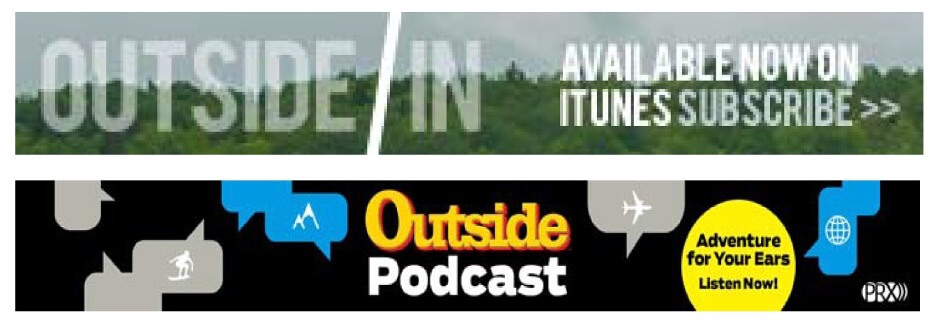
Reply All Corp. V. Gimlet Media, Inc. (Spotify Subsidiary)
Court: USDC SDNY Brooklyn Division
Name: REPLY ALL
Notes: Case Lasted almost 7 years. Closed in 3/2022.

How to Minimize Risk of Trademark Infringement for Podcast Branding.
- Step 1. Use a distinctive name that is not widely used.
- Step 2. Search Search Search. Search for unregistered (Common Law) use of the name for other podcast, entertainment, educational, content provider type services.
- Step 3. Search for your podcast trademark at the Trademark Office.
- Step 4. Consider Using Generic / Descriptive terms. The downside is lack of exclusivity. Everyone can use descriptive / generic terms.
- Step 5. Use the trademark registration system to legitimize your use. After 5 years of registration, apply to have your podcast trademark declared incontestable.
Final Advice About Branding a Podcast.
The Back Pocket / The Back Burner Brand / The Back Up Brand
As a business owner, have at least one back up name ready to go. Do the searches, lock in the domain names. Perhaps, even mix it in in with the primary branding to establish some common law trademark rights. You’ve already done the work producing, recording, learning the business. Once you are this far, it’s not much to pivot to a new brand if problems come up.
Reviews for Philly Trademark Registration Attorney Charles Riddle
Disclaimer: This information is for educational purposes, and is not intended to be legal advice. Each case turns on its own facts. Please consult with an experienced trademark attorney.
EsquireTrademarks.com – Online Trademark Attorneys – What We Do:
- Our trademark attorney, prepares and files trademark applications for clients throughout the United States and abroad.
- We prosecute and defend trademark infringement and unfair competition actions in the Federal Courts throughout the United States and abroad.
- We also prosecute trademark office actions and appeals before the United States Trademark Office.
- We handle internet based trademark disputes and trademark, DMCA, and copyright takedowns.
- We draw on our experience as trademark litigators to guide you through the trademark process.
- We support businesses, law firms, and individuals by providing top notch legal services in intellectual property matters.
